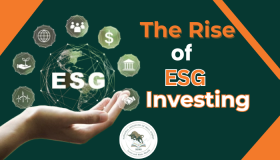31 Aug 2024
The Rise of ESG Investing: How Sustainable Funds are Changing the Market

The investment landscape is transforming significantly as more investors prioritise companies that generate profits and positively contribute to the environment and society. This shift is driven by Environmental, Social, and Governance (ESG) investing, a strategy that evaluates companies based on their performance in three key areas:
-
Environmental Stewardship: How effectively a company manages its impact on the environment.
-
Social Responsibility: How a company treats its employees, customers, suppliers, and communities.
-
Governance Practices: The fairness, transparency, and effectiveness of a company’s management and its treatment of shareholders.
ESG investing, which has roots in the social responsibility movements of the 1960s, has seen explosive growth since the early 2000s. ESG assets are projected to rise from $35 trillion in 2020 to approximately $50 trillion by 2025, driven largely by Millennials and Gen Z investors who seek to align their investments with ethical values.
At NIWS, a leading stock market institute in Indore, Jaipur, and Delhi, we are at the forefront of this investment revolution. Our comprehensive courses not only cover the fundamentals of stock market investing but also delve into integrating ESG criteria into investment decisions. This ensures our students are well-equipped to thrive in a market increasingly focused on sustainability and ethical practices.
How Sustainable Funds are Changing the Market
Sustainable funds play a pivotal role in transforming markets and influencing corporate behaviour. Here’s how these funds are making a significant impact:
Rapid Growth and Increasing Investor Interest
-
Exponential Market Growth: The ESG investing landscape has witnessed remarkable expansion, with global ESG assets projected to grow from $35 trillion in 2020 to $50 trillion by 2025. This surge is driven by a rising demand for investments that align with ethical and sustainable values.
-
Rising Investor Demand: Younger generations, especially Millennials and Gen Z, are leading the charge in demanding more ethical investment options, marking a clear shift towards values-based investing.
Strong Performance and Risk Mitigation
-
Competitive Financial Returns: ESG funds have demonstrated their ability to deliver returns that match or even exceed those of traditional funds. Notably, during the COVID-19 pandemic, ESG funds often outperformed, showcasing their resilience in challenging times.
-
Reduced Investment Risk: Companies with strong ESG practices tend to have lower risk profiles, benefiting from better governance and proactive management of environmental and social issues. This approach helps reduce the likelihood of fines, lawsuits, and reputational damage, ultimately lowering investment risk.
Influence on Corporate Behavior and Accountability
-
Driving Corporate Sustainability Initiatives: To attract ESG investments, companies are increasingly adopting sustainable practices, such as setting ambitious carbon reduction goals, enhancing transparency, and promoting diversity in leadership roles.
-
Empowering Shareholder Activism: Investors in ESG funds actively engage in shareholder activism, advocating for responsible business practices and holding companies accountable for their environmental and social impacts.
Regulatory and Policy Developments
-
Enhanced ESG Disclosure Requirements: Governments are tightening regulations around ESG reporting, with initiatives like the EU's Sustainable Finance Disclosure Regulation (SFDR) requiring greater transparency and consistency in sustainability disclosures.
-
Policy Support for Sustainable Investments: Public policies increasingly support ESG investments, offering tax incentives and backing for green bonds, sustainability-linked loans, and other financial products that promote environmental and social goals.
Challenges of Greenwashing and Standardization
-
Addressing Greenwashing: The threat of greenwashing—where companies exaggerate their ESG credentials—remains a significant challenge. This has prompted calls for stricter regulations and more rigorous standards to ensure the credibility of ESG claims.
-
Navigating Inconsistent Standards: A unified global standard for ESG reporting is needed to make it easier for investors to compare and evaluate sustainable funds. This inconsistency has led to increased demand for more standardised ESG reporting frameworks.
Innovation in ESG Financial Products and Analytics
-
Emergence of New ESG-Focused Financial Products: The rise of ESG investing has driven the development of innovative financial products, including green bonds, sustainability-linked loans, and impact investment funds. These products offer investors more opportunities to align their portfolios with their values.
Examples of Big Funds Making a Difference
Several ESG funds in India have been notably impacted by investing in companies committed to sustainable practices. Here are two prominent examples:
Aditya Birla Sun Life ESG Fund:
-
Focus: This fund invests in companies that excel in environmental stewardship and sound governance practices. By allocating capital to industries such as renewable energy and eco-friendly products, the fund supports the growth of sustainable businesses in India.
-
Impact: The fund drives the adoption of green technologies and encourages companies to enhance their sustainability initiatives, contributing to a more eco-conscious market environment.
Quantum India ESG Equity Fund:
-
Focus: This fund targets companies with high environmental and social responsibility scores. It supports sectors ranging from technology to consumer goods, ensuring its investments align with strong ethical standards.
-
Impact: By prioritising companies with robust ESG credentials, the Quantum India ESG Equity Fund fosters better corporate practices, promoting long-term sustainability and responsible business conduct across various industries.
Why ESG Investing is Growing & Its Impact on the Market
ESG investing, which stands for Environmental, Social, and Governance, is gaining popularity due to several key factors. Here’s why ESG investing is on the rise and how it’s impacting the market:
Why ESG Investing is Growing
-
Environmental Awareness:
-
Climate Concerns: As awareness of climate change increases, more investors are choosing to support companies that prioritise environmental sustainability. They believe these companies are better positioned for long-term success in a world increasingly focused on reducing carbon footprints.
-
-
Social Responsibility:
-
Ethical Investments: Investors are increasingly drawn to companies that contribute positively to society, such as those that treat their employees well, engage in community development, and ensure fair practices across their operations. This alignment with ethical values is a major driver of ESG investing.
-
-
Superior Management:
-
Governance Excellence: Companies exhibiting strong governance practices—such as transparency, accountability, and fair treatment of stakeholders—are considered safer investments. Investors prefer companies that operate with integrity and clear, ethical guidelines.
-
-
Regulatory Influence:
-
Government Mandates: Governments and regulatory bodies increasingly require companies to disclose how they address ESG issues. This push for transparency compels companies to adopt better practices, fostering a more sustainable business environment.
-
-
Financial Performance:
-
Profitable Sustainability: Research consistently shows that companies with strong ESG practices often achieve financial returns comparable to or exceeding their peers. This makes them attractive to investors who seek both ethical alignment and profitability.
-
Impact on the Market
-
Capital Allocation:
-
Investment Shifts: Capital is increasingly directed toward eco-friendly and sustainable businesses, particularly in sectors like renewable energy. This shift drives growth and innovation in these areas, reshaping the market landscape.
-
-
Corporate Behavior:
-
Operational Improvements: As investor interest in ESG grows, companies are incentivised to enhance their environmental and social practices to attract investment. This leads to better treatment of the environment and improved conditions for employees.
-
-
Market Stability:
-
Resilience in Tough Times: Companies that adhere to ESG principles often demonstrate greater resilience during economic downturns. Their proactive approach to managing risks contributes to overall market stability.
-
-
Valuation Impact:
-
Value Shift: The increasing importance of ESG criteria is influencing company valuations. Companies that excel in ESG are often valued higher, while those that pay attention to these principles may see a decline in investor interest and market value.
-
-
Influence on Smaller Companies:
-
Competitive Pressure: As large companies and institutional investors emphasise ESG, smaller businesses must adopt similar practices to remain competitive and attract capital.
-
Conclusion
India faces serious issues like heatwaves, floods, and pollution that harm crops, water, and health. To tackle these problems, India plans to cut its carbon emissions by 45% by 2030 and achieve zero emissions by 2070. This big goal needs a lot of investment, especially in clean energy and technology. ESG investing, which looks at environmental, social, and governance factors, is key to getting this money. Everyone—companies, the government, schools, and people—needs to work together. As more people invest in ESG, India’s economy will be greener and meet our environmental targets.
Frequently Asked Questions
Q.1 What are some lesser-known ESG funds that have made significant impacts?
Ans: The Parnassus Endeavor Fund and the Calvert Equity Fund are examples of lesser-known ESG funds that have had positive effects by investing in companies with good workplace practices and sustainable models.
Q. 2 How do ESG funds influence small and medium-sized enterprises (SMEs)?
Ans: ESG funds help SMEs by providing money and support for adopting sustainable practices, which can lead to business growth and more opportunities.
Q. 3 Can you list some successful ESG funds from emerging markets?
Ans: The IFC Amundi Planet Emerging Green One Fund and the Matthews Asia ESG Fund are successful ESG funds in emerging markets, focusing on green bonds and companies with good ESG practices.
Q. 4 What role do ESG funds play in promoting renewable energy projects?
Ans: ESG funds invest in renewable energy projects and companies, helping to increase sustainable energy use and reduce environmental impact.
Q. 5 How do ESG funds contribute to social change in underdeveloped regions?
Ans: ESG funds invest in projects and companies that improve education, healthcare, and economic growth, helping to improve living conditions and opportunities in underdeveloped areas.
